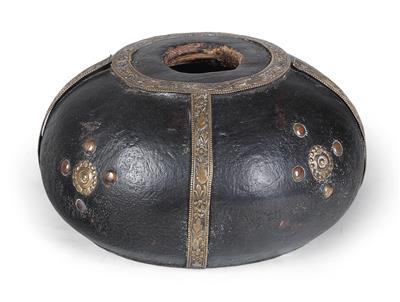India, Rajasthan, Thar Desert, tribe: Bishnoi: an opium receptacle made of wood, decorated with ornamental metal bands and rosettes.
India, Rajasthan, Thar Desert, tribe: Bishnoi: an opium receptacle made of wood, decorated with ornamental metal bands and rosettes.

The Bishnoi are more of a religious community than an ethnic one. They have lived in the Thar Desert in Rajasthan, northwestern India, and in the neighbouring states of Gujarat, Haryana, Punjab and Delhi for more than 500 years. The Bishnoi number around 300,000, and they follow a strict vegetarian diet (or more precisely, ‘lacto-vegetarian’ – no meat, but milk is permitted), they do not kill animals nor chop down trees. Bishnoi actually means ‘twenty-nine’: even today, they live in accordance with the twenty-nine rules of their guru Jambheshwar, who lived in the 16th century.
However, the Bishnoi have been doing something else since time immemorial which is probably the only instance of this in the whole world: they drink opium tea. It is true that the extraction and use of opium is strictly prohibited in India, except for medicinal purposes. Only the Bishnoi have been granted an exemption: on the grounds of religious tradition. Even their guru Jambheshwar prohibited the smoking of tobacco and opium in his twenty-nine commandments – but he said nothing about drinking it...
To the present day, the Bishnoi brew their opium tea for their own ‘amal ceremonies’ or as a welcome drink for their guests. Seeds from the opium poppy or small balls of raw opium are crushed down, boiled in hot water and flavoured with sugar and spices. Then the brew is sieved multiple times and drunk from the host’s cupped hand. The effects of Bishnoi opium tea, traditionally weak, allegedly mirror those of a glass of wine.
The Bishnoi use vessels such as the present one to store their poppy seeds and balls of raw opium for their opium tea: round, bulging, and relatively squat, with a small round hole at the top. Crafted from a piece of wood (from a tree which died, not one which was cut down) and dyed black on the outside. Brass bands with leafy, floral tendrils, as well as four brass rosettes with decorative nails act as ornamentation.
An original ethnographic object (if one knows what it was once used for). With a good, old usage patina. One decorative band is missing (lost over the course of time). Otherwise no damage.
Height: 7.7 cm;
Diameter: c. 14.5 cm. First half of the 20th century. (ME)
Provenance: Sammlung Dr. Fritz Trupp; dann: Austrian private collection.
Esperto: Prof. Erwin Melchardt
 Prof. Erwin Melchardt
Prof. Erwin Melchardt
+43-1-515 60-465
erwin.melchardt@dorotheum.at
06.04.2017 - 15:00
- Prezzo di partenza:
-
EUR 200,-
India, Rajasthan, Thar Desert, tribe: Bishnoi: an opium receptacle made of wood, decorated with ornamental metal bands and rosettes.
The Bishnoi are more of a religious community than an ethnic one. They have lived in the Thar Desert in Rajasthan, northwestern India, and in the neighbouring states of Gujarat, Haryana, Punjab and Delhi for more than 500 years. The Bishnoi number around 300,000, and they follow a strict vegetarian diet (or more precisely, ‘lacto-vegetarian’ – no meat, but milk is permitted), they do not kill animals nor chop down trees. Bishnoi actually means ‘twenty-nine’: even today, they live in accordance with the twenty-nine rules of their guru Jambheshwar, who lived in the 16th century.
However, the Bishnoi have been doing something else since time immemorial which is probably the only instance of this in the whole world: they drink opium tea. It is true that the extraction and use of opium is strictly prohibited in India, except for medicinal purposes. Only the Bishnoi have been granted an exemption: on the grounds of religious tradition. Even their guru Jambheshwar prohibited the smoking of tobacco and opium in his twenty-nine commandments – but he said nothing about drinking it...
To the present day, the Bishnoi brew their opium tea for their own ‘amal ceremonies’ or as a welcome drink for their guests. Seeds from the opium poppy or small balls of raw opium are crushed down, boiled in hot water and flavoured with sugar and spices. Then the brew is sieved multiple times and drunk from the host’s cupped hand. The effects of Bishnoi opium tea, traditionally weak, allegedly mirror those of a glass of wine.
The Bishnoi use vessels such as the present one to store their poppy seeds and balls of raw opium for their opium tea: round, bulging, and relatively squat, with a small round hole at the top. Crafted from a piece of wood (from a tree which died, not one which was cut down) and dyed black on the outside. Brass bands with leafy, floral tendrils, as well as four brass rosettes with decorative nails act as ornamentation.
An original ethnographic object (if one knows what it was once used for). With a good, old usage patina. One decorative band is missing (lost over the course of time). Otherwise no damage.
Height: 7.7 cm;
Diameter: c. 14.5 cm. First half of the 20th century. (ME)
Provenance: Sammlung Dr. Fritz Trupp; dann: Austrian private collection.
Esperto: Prof. Erwin Melchardt
 Prof. Erwin Melchardt
Prof. Erwin Melchardt
+43-1-515 60-465
erwin.melchardt@dorotheum.at
|
Hotline dell'acquirente
lun-ven: 10.00 - 17.00
kundendienst@dorotheum.at +43 1 515 60 200 |
| Asta: | Tribal Art |
| Tipo d'asta: | Asta in sala |
| Data: | 06.04.2017 - 15:00 |
| Luogo dell'asta: | Wien | Palais Dorotheum |
| Esposizione: | 01.04. - 06.04.2017 |
